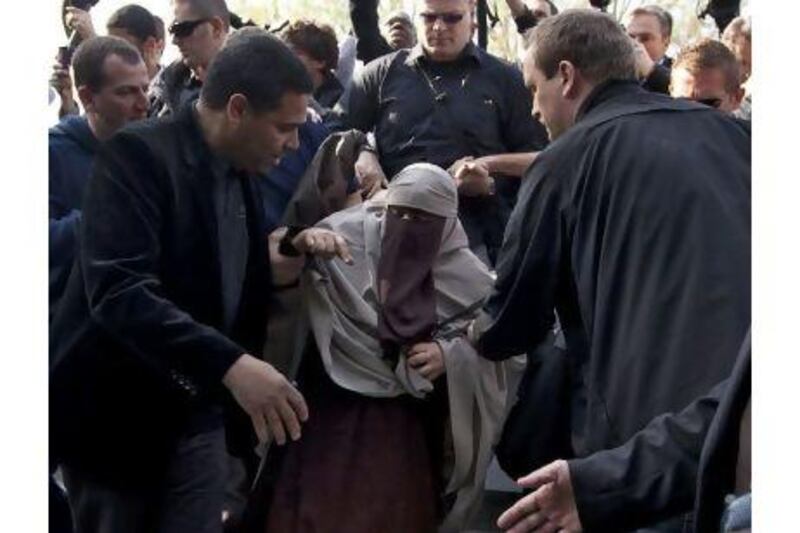Marseille // France's controversial ban on veils took legal effect yesterday - and some Muslims have already shown themselves ready to fight the new law whatever the consequences.
There were immediate challenges by Muslim women, a businessman's pledge to pay any fines imposed and police warnings that enforcement would be hazardous.
Less than two years after the president, Nicolas Sarkozy, declared his wish to outlaw a choice of clothing he said was "not welcome on our territory", it became an offence to conceal the face behind a veil in public places.
A woman defying the law - as some did yesterday in defence of their right to choose - is liable to a fine of €150 (Dh795) and mandatory attendance in a course on citizenship. A man who forces a woman to cover her face could be jailed for a year or fined up to €30,000, or double that if a minor is coerced.
Fewer than 3,000 women are thought to be at risk of arrest on estimates of how many wear what the French call "le voile integral", and many put the figure much lower.
Outside the Elysée Palace, one woman in a face-covering veil was taken to a police station, according to Rachid Nekkaz, a French-Algerian businessman behind the lobby group Hands Off My Constitution. He said the woman was not penalised.
At the Notre Dame cathedral, three veiled women - including one whose niqab did not conceal her face and was therefore within the law - were detained, along with others protesting against the ban. The women were detained for taking part in unauthorised demonstration, police said, and not because of their dress.
Kenza Drider, a French citizen who has covered her face in public for 13 years and has become a vocal figure in the controversy, was among those arrested.
Ms Drider had earlier boarded a Paris-bound train in the southern city of Avignon without any attempt being made to arrest her. She said she would continue to dress according to conscience and, if fined, take her case to the European Court of Human Rights.
"This law infringes my European rights and I must defend my liberty to come and go, my religious freedom," she said.
Mr Nekkaz has raised more than Dh400,000 and is selling a property valued in excess of Dh5 million for a fund to defend women punished under the law. "This law brings shame on the country, democracy and justice," he said.
The law threatens relations between French authority and its Muslim population, which is the largest in Europe, estimated at between five and seven million. It results from a parliamentary inquiry ordered by Mr Sarkozy's centre-right government after the president's speech to French parliamentarians at Versailles in June 2009.
He said at the time: "The burqa is not a religious problem. It is an issue of the dignity of women. It is a sign of subservience, submission … we cannot accept in our country women who are prisoners behind netting, cut off from all social life, deprived of identity."
In what France perhaps hoped would seem a classic display of republican consensus, the committee that recommended the ban was headed by a communist, André Guerin, then mayor of Vénissieux, a town near Lyon with a large Muslim population.
But with presidential elections only a year away, the resulting law has come to be seen as part of Mr Sarkozy's response to the growing popularity of Marine Le Pen's far right, anti-immigration Front National (FN).
At the weekend, the socialist opposition condemned Mr Sarkozy's new interior minister, Claude Guéant, for acting like the "minister for the FN". Mr Guéant caused uproar on the eve of last week's debate on the secular state by talking about the "problems" posed by a Muslim community that had grown enormously since France passed its law separating church and state in 1905.
Emmanuel Roux, assistant secretary general of a police superintendents' association, predicted that the law would be "infinitely difficult to enforce" and seldom applied in practice, adding that the most difficult offence to prove would be that a woman had been forced to cover her face.
He said on France Inter Radio that officers coming across a fully veiled woman would "try to make her understand, try to convince her". He envisioned situations in which a police attempt to enforce the law could cause problems if the woman was with assertive men.
Guidelines sent to police stipulate that veils must not be removed by force and officers have also been told the ban does not apply to women in private cars. Action may still be taken under traffic regulations, though, in one case last year, even this backfired when an appeal court overturned a fine on a woman who had been accused of driving without a clear field of vision.
French opinion is divided. At the website of the radio station Europe 1, several contributors welcomed the law; one making the frequently heard point that concealment of the face was a security issue.
"Personally, I am against someone whose face I cannot see penetrating into my children's schools or other public places," one wrote, claiming that "terrorists, lunatics and robbers" might also wish to hide themselves.
But another visitor to the site asked whether the government would next make it compulsory to fly the French flag at home, adding: "I am native French and a Christian, but feel wounded by this law."







